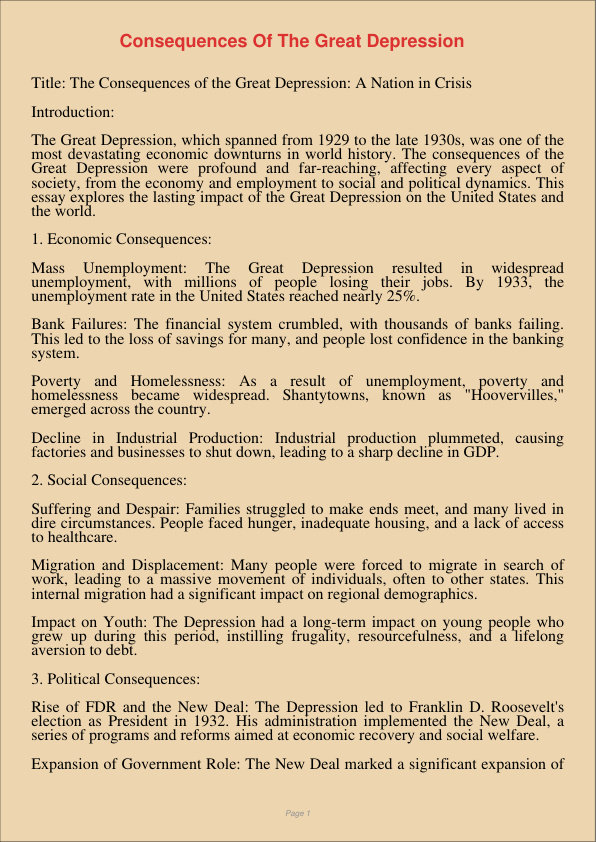Title: The Consequences of the Great Depression: A Nation in Crisis
Introduction:
The Great Depression, which spanned from 1929 to the late 1930s, was one of the most devastating economic downturns in world history. The consequences of the Great Depression were profound and far-reaching, affecting every aspect of society, from the economy and employment to social and political dynamics. This essay explores the lasting impact of the Great Depression on the United States and the world.
- Economic Consequences:
Mass Unemployment: The Great Depression resulted in widespread unemployment, with millions of people losing their jobs. By 1933, the unemployment rate in the United States reached nearly 25%.
Bank Failures: The financial system crumbled, with thousands of banks failing. This led to the loss of savings for many, and people lost confidence in the banking system.
Poverty and Homelessness: As a result of unemployment, poverty and homelessness became widespread. Shantytowns, known as “Hoovervilles,” emerged across the country.
Decline in Industrial Production: Industrial production plummeted, causing factories and businesses to shut down, leading to a sharp decline in GDP.
- Social Consequences:
Suffering and Despair: Families struggled to make ends meet, and many lived in dire circumstances. People faced hunger, inadequate housing, and a lack of access to healthcare.
Migration and Displacement: Many people were forced to migrate in search of work, leading to a massive movement of individuals, often to other states. This internal migration had a significant impact on regional demographics.
Impact on Youth: The Depression had a long-term impact on young people who grew up during this period, instilling frugality, resourcefulness, and a lifelong aversion to debt.
- Political Consequences:
Rise of FDR and the New Deal: The Depression led to Franklin D. Roosevelt’s election as President in 1932. His administration implemented the New Deal, a series of programs and reforms aimed at economic recovery and social welfare.
Expansion of Government Role: The New Deal marked a significant expansion of the federal government’s role in the economy and social safety nets. It laid the foundation for the modern welfare state.
- International Consequences:
Global Economic Impact: The Great Depression was not confined to the United States; it had a worldwide impact. International trade and finance suffered, leading to a global economic downturn.
Rise of Authoritarianism: In some countries, the economic hardships of the Great Depression contributed to the rise of authoritarian regimes, such as Hitler in Germany and Mussolini in Italy.
- Cultural Consequences:
Artistic and Literary Expression: The Great Depression influenced various forms of artistic expression, with many artists, writers, and photographers capturing the struggles of the era. Works such as Dorothea Lange’s photographs and John Steinbeck’s “The Grapes of Wrath” reflect this period.
Reshaping Values: The hardships of the Depression reshaped cultural values, emphasizing resilience, community, and solidarity.
Conclusion:
The consequences of the Great Depression were profound and far-reaching, reshaping the economic, social, political, and cultural landscape of the United States and the world. The period left an indelible mark on the collective memory and continues to serve as a reminder of the importance of effective economic policies and social safety nets to prevent such widespread suffering and devastation in the future. The lessons learned during this tumultuous time continue to inform economic and political decision-making today.

「真诚赞赏,手留余香」
真诚赞赏,手留余香
使用微信扫描二维码完成支付
